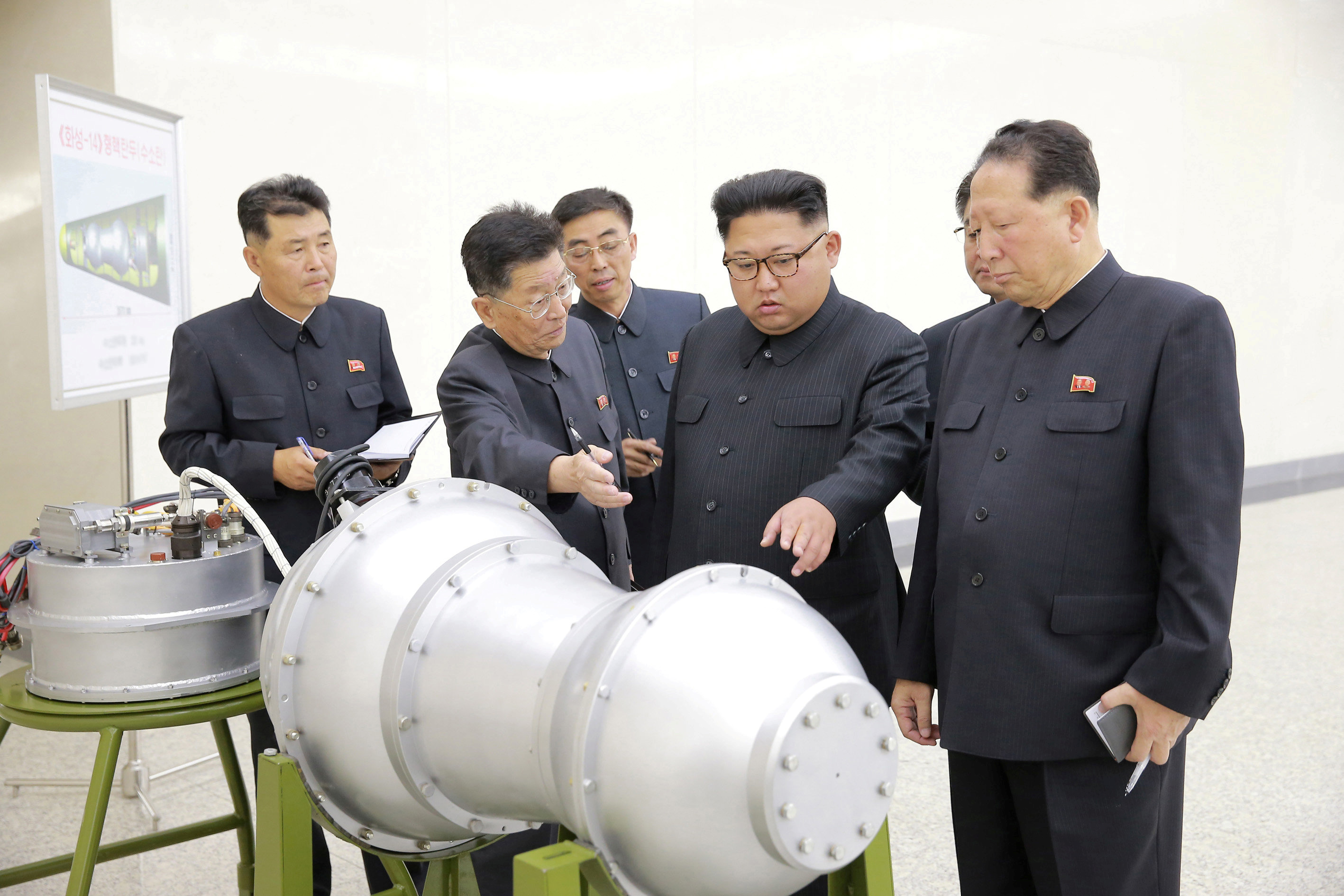Why can't we live with a nuclear North Korea?
Panicked hyperbole will never solve the North Korea problem. It's time to be realistic.


How do you "solve" the North Korea problem? This question has dominated U.S. foreign policy discussions for years. Former President Barack Obama warned President Trump before his inauguration that the small, poor, nuclear-armed country could pose the most urgent foreign policy challenge of his presidency.
Despite extensive economic sanctions and diplomatic pressure, North Korea continues to advance its military power. Last week, North Korea tested an intercontinental ballistic missile (ICBM) that could potentially reach the entire continental U.S. American politicians are scrambling to figure out how to respond.
Unfortunately, the first and primary position on the part of most U.S. policymakers has been panicked overreaction. Sen. Lindsey Graham (R-S.C.) told CNN, "If we have to go to war to stop this, we will. If there's a war with North Korea it will be because North Korea brought it on itself, and we're headed to a war if things don't change."
The Week
Escape your echo chamber. Get the facts behind the news, plus analysis from multiple perspectives.

Sign up for The Week's Free Newsletters
From our morning news briefing to a weekly Good News Newsletter, get the best of The Week delivered directly to your inbox.
From our morning news briefing to a weekly Good News Newsletter, get the best of The Week delivered directly to your inbox.
AEI Fellow Marc Thiessen argued in The Washington Post that Trump should declare North Korea "a ballistic missile 'no-fly zone' and a nuclear weapons 'no-test zone.'"
"Any attempt by North Korea to launch a ballistic missile will be met with a targeted military strike either taking out the missile on the launch pad or blowing it up in the air using missile defense technology," he argued. "And any attempt to test a nuclear weapon will be met with a targeted strike taking out the test site and other related nuclear facilities."
North Korea is an oppressive and dictatorial country, one that has committed a plethora of human rights atrocities against its citizens, and which uses propaganda and antagonism to anger its opponents on the world stage. We know this. But while concerning, this new step by North Korea is neither unexpected nor revolutionary. The fundamentals of the situation remain unchanged. Policymakers need to take a deep breath.
North Korea's iterative military advancement and growth does not negate the fact that it is a poor, weak country with few resources at its disposal. Its power and potential for harm are vastly overshadowed by our own. As frightening as this new ICBM test may seem, it changes little (or at least, should change little) for U.S. foreign policy.
A free daily email with the biggest news stories of the day – and the best features from TheWeek.com
Calling for war or military strikes to remove their nuclear capabilities is a counterproductive and dangerous policy. U.S. resources and presence in the region are already considerable — as American University scholar Joshua Rovner explains, "The best way to deter nuclear powers from using their arsenals to act more conventionally aggressive is by maintaining local conventional superiority. This enhances deterrence without risking escalation, which in turn reduces questions about credibility and alleviates stress on alliances."
South Korea's President Moon Jae-in opposes preventive strikes in response to North Korea's recent tests, and has expressed some concern that the U.S. might act prematurely. "We must stop a situation where North Korea miscalculates and threatens us with nuclear weapons or where the United States considers a pre-emptive strike," he said at a recent emergency meeting in Seoul.
Attempting to overthrow or undermine North Korea's regime would have massive implications for South Korea, as well as for China and North Korea's vulnerable citizenry. In this instance, preventive military action would result in a bevy of unintended consequences, yet nobody in the Trump administration talks about this.
North Korea, after all, is acting in its own perceived interests. Rightly or wrongly, it sees the U.S. and South Korea as a threat to its sovereignty and often acts in response to our two countries' military exercises in the region. China has warned that isolation and coercive tactics are unlikely to convince Kim Jong Un, whose goal is and always will be the preservation of his regime.
Thus, at some point, it becomes necessary for the U.S. to ask the question: How can we best deter North Korea and avoid preventive military action? We live with a nuclear China and Russia, after all, and we deter them — surely we can deter the far weaker and poorer North Korea (and save ourselves the catastrophic consequences likely to be created by war with the nation).
Ironically enough, "American might"-espouser Max Boot has suggested just this, stating, "We can live with a nuclear North Korea just as we live with nuclear Russia and China. Would have been nice to avert nuclearization ... but in N Korea it's too late."
In the face of massive pressure, Kim has built up his country's nuclear capabilities. That's a good indication that he should be taken at his word that this program is viewed as necessary for survival. That's precisely why it's unlikely that he wants to start a nuclear war with the United States. While North Korea has a handful of nuclear weapons, the U.S. has thousands both deployed and in storage. For Kim, launching a nuclear attack would be suicide.
"Maximum pressure" will not work with North Korea. The U.S. must instead consider a strategy that acknowledges North Korea's purpose and personality — and one that inspires confidence and respect in our allies, most especially South Korea, whose confidence in us seems to have been shaken by recent events.
As Daniel Larison recently argued for The American Conservative:
The U.S. and its allies have lived with far larger threats from nuclear-armed adversaries for decades (and still live with them), and the threat from North Korea can be similarly managed and deterred. Our culture of threat inflation has made North Korea's acquisitions of these technologies seem far more frightening than they have to be, but we need to stop panicking over this and begin thinking carefully about how to adapt to the new reality. [The American Conservative]
Although a nuclear North Korea is far from ideal, descending into panic will not serve U.S. interests abroad, and it won't keep America safe. The Trump administration must consider the dangerous ramifications of their belligerent stance toward North Korea, before they make a catastrophic miscalculation.
Gracy Olmstead is a writer and journalist located outside Washington, D.C. She's written for The American Conservative, National Review, The Federalist, and The Washington Times, among others.
-
 Metal-based compounds may be the future of antibiotics
Metal-based compounds may be the future of antibioticsUnder the radar Robots can help develop them
-
 Europe’s apples are peppered with toxic pesticides
Europe’s apples are peppered with toxic pesticidesUnder the Radar Campaign groups say existing EU regulations don’t account for risk of ‘cocktail effect’
-
 Political cartoons for February 1
Political cartoons for February 1Cartoons Sunday's political cartoons include Tom Homan's offer, the Fox News filter, and more
-
 Israel retrieves final hostage’s body from Gaza
Israel retrieves final hostage’s body from GazaSpeed Read The 24-year-old police officer was killed during the initial Hamas attack
-
 China’s Xi targets top general in growing purge
China’s Xi targets top general in growing purgeSpeed Read Zhang Youxia is being investigated over ‘grave violations’ of the law
-
 Panama and Canada are negotiating over a crucial copper mine
Panama and Canada are negotiating over a crucial copper mineIn the Spotlight Panama is set to make a final decision on the mine this summer
-
 Why Greenland’s natural resources are nearly impossible to mine
Why Greenland’s natural resources are nearly impossible to mineThe Explainer The country’s natural landscape makes the task extremely difficult
-
 Iran cuts internet as protests escalate
Iran cuts internet as protests escalateSpeed Reada Government buildings across the country have been set on fire
-
 US nabs ‘shadow’ tanker claimed by Russia
US nabs ‘shadow’ tanker claimed by RussiaSpeed Read The ship was one of two vessels seized by the US military
-
 How Bulgaria’s government fell amid mass protests
How Bulgaria’s government fell amid mass protestsThe Explainer The country’s prime minister resigned as part of the fallout
-
 Femicide: Italy’s newest crime
Femicide: Italy’s newest crimeThe Explainer Landmark law to criminalise murder of a woman as an ‘act of hatred’ or ‘subjugation’ but critics say Italy is still deeply patriarchal
